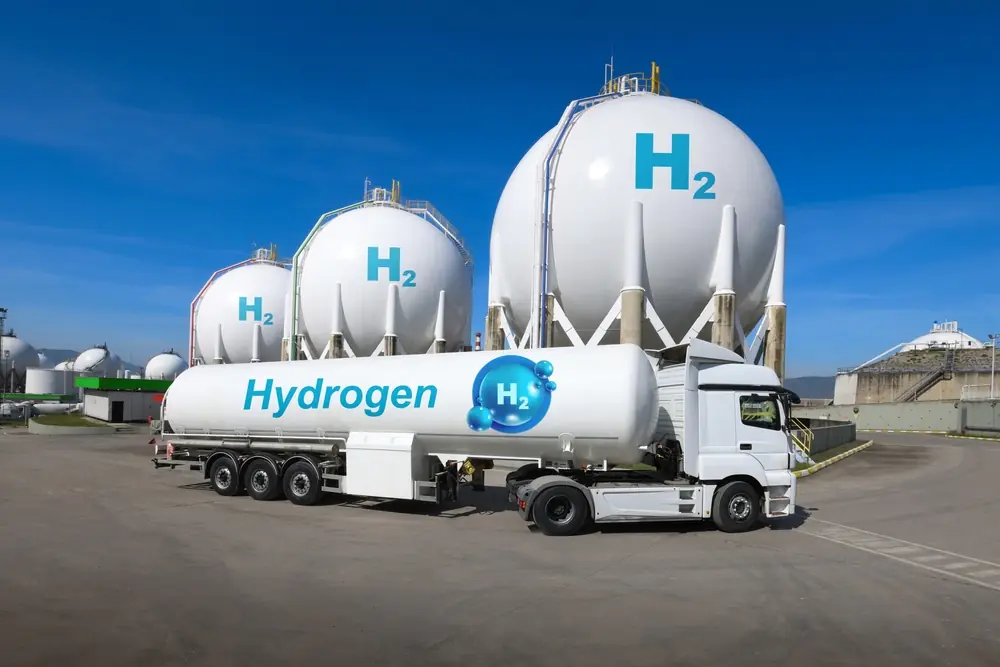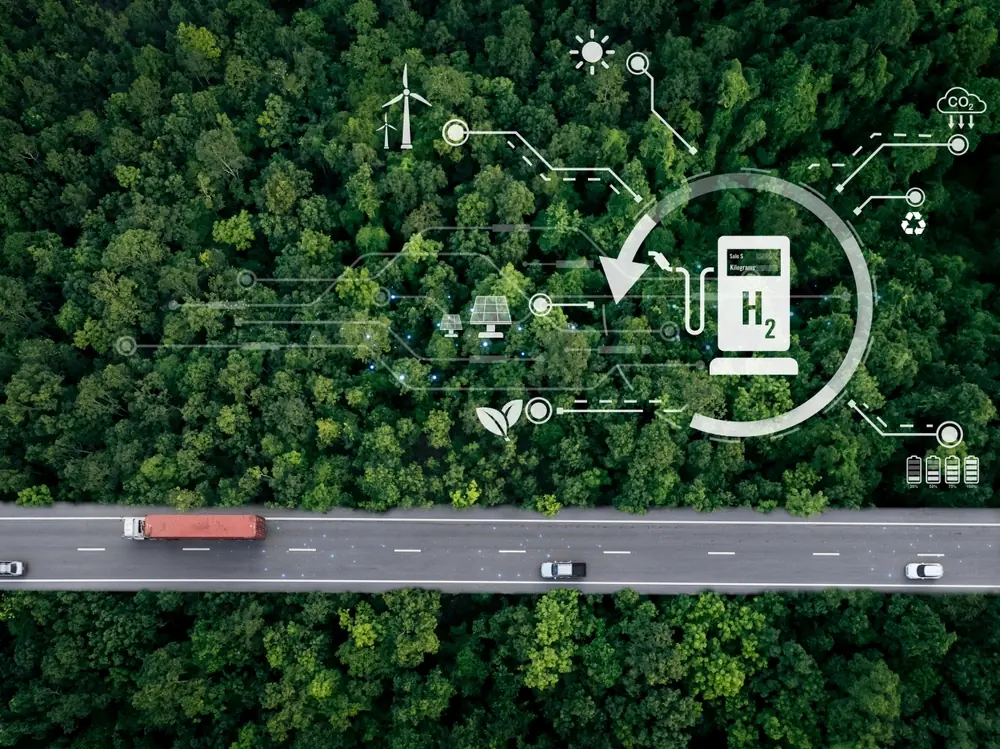
Model Predictions of Global Geologic Hydrogen Resources
Scientists have discovered massive hydrogen reserves hidden beneath the Earth’s surface – enough to power our world for 200 years. While energy companies race to produce “green” and “blue” hydrogen through expensive industrial processes, nature has quietly created vast stores of clean hydrogen deep underground. Hydrogen is versatile and abundant, emitting only water vapor when used, making it one of the cleanest energy sources available.
Researchers have recently uncovered that vast amounts of natural hydrogen lie hidden beneath the Earth’s surface. This revelation could dramatically shift our energy strategies, offering a resource that might sustainably meet the world’s energy needs for the next two centuries.
The Big Picture: What Did Scientists Find?
Scientists have identified massive potential hydrogen reserves deep underground, fundamentally altering our understanding of available energy resources. Using advanced modeling techniques, researchers at the US Geological Survey have predicted that Earth’s subsurface could hold between 103 to 10^10 million metric tons of hydrogen.
These newly discovered reserves have the potential to power global energy needs for approximately 200 years. This finding is based on current energy consumption trends and the projected increase in demand, particularly for clean and sustainable energy sources.
Compared to energy content, hydrogen reserves contain about twice the energy of all the world’s known natural gas reserves. This comparison highlights the sheer magnitude of the discovery and its potential to transform energy systems worldwide by providing a much larger and cleaner energy source.
Breaking Down the Science of Geologic Hydrogen
Geologic hydrogen, naturally occurring in the Earth’s subsurface, forms from various geological processes. One primary method is the interaction of water with certain minerals at high temperatures and pressures, which releases hydrogen gas which is a process akin to natural hydrogen production in geological settings like hydrothermal vents.
You can find geologic hydrogen in regions known for volcanic and tectonic activity where Earth’s crust is dynamic. These areas provide the perfect conditions—high temperatures and specific mineral compositions—that facilitate the natural production of hydrogen. Due to their similar geological environments, regions with a history of oil and natural gas deposits are also promising areas.
Advances in geoscience and more profound drilling technologies have recently propelled this discovery into the spotlight. Enhanced sensing equipment and improved geological models have allowed scientists to detect and quantify hydrogen in places previously considered improbable. These technological advancements have enabled tapping into Earth’s hidden hydrogen resources, opening new frontiers in the quest for clean energy sources.
The Numbers That Matter
According to International Energy Agency projections, the global demand for hydrogen will reach 530 million metric tons annually by 2050. Natural hydrogen reserves could meet these growing needs many times over, with scientists estimating underground reserves between 103 and 1010 million metric tons.
Most promising estimates suggest Earth harbors around 5.6 million metric tons of natural hydrogen. While not all deposits will prove accessible or economically viable to extract, even recovering just 2% (approximately 100,000 metric tons) would supply global hydrogen needs for 200 years at projected consumption rates.
Production timelines mirror historical natural gas development patterns. Based on the growth of the US shale gas industry, natural hydrogen extraction could start significantly contributing to global supply within decades. Models predict natural hydrogen production could provide half of the projected “blue” hydrogen supply by 2100, dramatically reducing the need for carbon capture and storage infrastructure.
Recovery rates for natural hydrogen should exceed those for typical oil extraction (30-35%) and match those for natural gas (50-80%). Based on these figures, researchers estimate that about 10% of total underground hydrogen reserves could be practically recovered—still enough to transform global energy markets.
Environmental Impact and Benefits

Geologic hydrogen, compared to other hydrogen production methods like green and blue hydrogen. Green hydrogen is produced via water electrolysis using renewable energy sources, making it relatively clean but often constrained by the availability and cost of renewable energy. Blue hydrogen, generated from natural gas where the CO2 emissions are captured and stored, still relies on fossil fuels. In contrast, geologic hydrogen, once accessed, provides a cleaner option as it involves extracting pre-existing hydrogen gas directly from underground, bypassing the need for energy-intensive processes and avoiding CO2 emissions entirely.
Exploiting geologic hydrogen could significantly reduce the environmental footprint associated with hydrogen production. However, careful consideration of potential environmental impacts is crucial. Extraction processes must be managed to prevent unintended consequences, such as land disturbance or releasing trapped gases other than hydrogen. Moreover, as exploration expands, continuous monitoring and adaptive management strategies will be essential to mitigate impacts, ensuring that geologic hydrogen can be a sustainable part of our clean energy arsenal. These proactive measures could pave the way for a hydrogen economy that supports energy needs without compromising environmental integrity.
Future Perspectives and Challenges
Research priorities must focus on understanding how hydrogen accumulates and preserves in underground reservoirs. Scientists need better tools to detect hydrogen deposits, similar to how seismic surveys locate oil and gas. Current exploration methods remain limited, leaving vast potential reserves undiscovered.
Key technical questions demand answers:
- How efficiently can hydrogen move through different rock types?
- What natural processes consume hydrogen underground?
- Which geological formations best preserve hydrogen deposits?
- Where should exploration companies focus their efforts?
Development challenges mirror early shale gas exploration, requiring significant investment in new technologies and expertise. Companies must adapt existing natural gas equipment for hydrogen’s unique properties, including its smaller molecular size and different flow behaviors.
Investment needs span multiple areas:
- Advanced exploration technologies
- Specialized drilling and extraction equipment
- Storage and transport infrastructure
- Safety monitoring systems
According to Prof Bill McGuire, an Earth scientist at University College London (UCL) who was not involved in the study, told BBC Science Focus. ‘’To suck up hydrogen at a scale required to make a contribution to bringing down emissions and tackling the climate emergency would require an enormous global initiative, for which we simply don’t have time’’
Prof Bill McGuire further argues, “It would also need a massive amount of supporting infrastructure in terms of rigs, access roads, storage, transport and more. Furthermore, it seems to me that we might now know how much hydrogen there is, but that is not the same as knowing where it is.
Moreover, Prof Bill McGuire states, “There is more than enough free energy available from wind and the Sun alone, and the technologies are straightforward, well-tested and well-established, so I really don’t see the need for exploiting what is, ultimately, another finite resource.”
Mali’s recent hydrogen discovery provides valuable insights for future development. Natural hydrogen fields there produce nearly pure hydrogen at shallow depths, suggesting similar deposits might exist worldwide. However, exploration companies need a better understanding of where to look and how to identify promising sites.
Promising Future of Geologic Hydrogen

As we stand on the brink of a new era in energy production, the discovery of geologic hydrogen offers more than just an alternative energy source; it presents a pivotal opportunity for a global energy transformation. This breakthrough could catalyze a shift towards a more sustainable, cleaner energy system that aligns with growing environmental responsibilities and the urgent need for decarbonization.
A collaborative global effort is essential to capitalizing on this opportunity. By pooling resources, sharing knowledge, and aligning international energy policies, countries can accelerate the development of geologic hydrogen infrastructure and technology. Such cooperation would advance scientific understanding, foster economic growth, create jobs, and maintain energy security without compromising the health of our planet.
While the road ahead is fraught with challenges, the rewards promise to be substantial. By embracing the hydrogen future with open arms and vigilant minds, we can ensure this natural boon is a temporary beacon and a lasting pillar of global energy stability.
News in the same category


Top 10 Magnesium-Rich Foods That Can Help Lower Blood Pressure Naturally

How to Reduce Uric Acid Crystals Naturally and Lower the Risk of Gout and Joint Pain

Why Do Women Cross Their Legs When Sitting

Clench Your Fist And Count The Palm Lines

You’re Doing It All Wrong: The Right Way to Store Winter Coats

I Found a Tiny Red Object With Metal Prongs in My Kitchen Drawer — Here’s What It Actually Is

8 Reasons Why Adding Baking Soda to Your Toilet Tank Is a Must-Try Trick

Quick Ways to Stop a Draft Under Your Front Door — While You Wait for the Handyman

Most People Will Go Their Entire Lives Without Knowing What the Decorative Bands on Bath Towels Really Mean

‘Black Diamond’ Apples Exist — A Rare Variety Only Found in China And Tibet

Norway Declares Nationwide Ban on Deforestation In World-First

Finally! People Are Getting Fined for Loud Speakerphone Calls in Public

Don’t Sleep With Your Pets

The Meaning of Having an Unmade Bed

People Who Should Avoid Eating Kohlrabi (Su Hào), Even If They Really Crave It

Dandelion: A “Superfood” Herb with Real Nutrients — What Science Says

Woman (26) Dies After Eating Hot Pot: 2 Things You Should Never Do Together When Enjoying Hot Pot

If the Body Is Developing Cancer, Three Nighttime Sleep Signs May Appear — But Many People Ignore Them

Claim: “Cancer Cells Eliminated in 42 Days with a Special Juice — Worldwide Celebration?”
News Post

The Root that Helps the Liver Detoxify and Effectively Reduce Inflammation

Why You Should Never Pour Hot Water Into The Sink

There’s this crusty little spot that keeps scabbing and reopening, and I can’t get in to see anyone yet. What could this be?

FDA Approves Steam-Based Device for Prostate Cancer Treatment, but Questions Remain

Uterine Fibroids May Signal Increased Risk of Heart Disease, New Research Suggests

Cannabis Hyperemesis Syndrome: Why Emergency Department Visits Surged During the Pandemic

The secret button on a computer with ‘magical’ functions that not everyone knows about

Viral Infections Can Triple the Risk of Heart Attack and Stroke

Australian HPV Vaccination Marks Cervical Cancer Milestone

My outdoor faucet suddenly froze and now I’m seeing water seeping indoors — what should I do before a plumber can come?

Vitamin K2 Supplementation and Vascular Health in Chronic Kidney Disease

Daily Prune Consumption and Bone Health in Postmenopausal Women

Montmorency Tart Cherry Juice as an Adjunctive Therapy in Ulcerative Colitis

Methylene Blue–Based Photodynamic Therapy as a Selective Strategy Against Breast Cancer Cells

Regenerating True Articular Cartilage: A Breakthrough in Joint Repair

Deuterium-Depleted Water and Long-Term Survival in Cancer Patients: Evidence from a Hungarian Population-Based Analysis

Daily cocoa extract supplements lowered cardiovascular disease deaths by 27%

Ivermectin stopped aggressive cancer cells from moving and spreading in lab tests

These brown crusty spots keep showing up, and my doctor is booked for weeks given Christmas. Should I be concerned?
